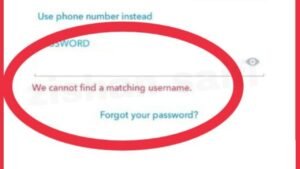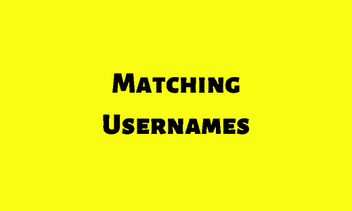Matching User Names, In the new world of digital contact where user names are the name by which both human beings and personalities are identified and first impressions are made, “similar names” has become a popular and relevant noun in recent years. Whether surfing through online forums, playing multiplayer video games, using social media, or searching for their soul mates with dating apps, the degree of integration of the name would create a feeling of togetherness, group belonging, and enjoyment. This is the tradition of checking usernames with an individual, be it a friend, partner, or group, which has now become the new subtle but powerful tradition of expressing a link or identity in the virtual world. Here, in this article, we shall discuss the fine aspects of matching usernames, their psychological influence, the impact on community building, and why they are becoming more popular in the age of digital interaction.
Matching usernames: The psychological appeal
Human beings are gregarious animals, and we always find ways to reach out to someone. We might do it by verbal cues, body languages, or shared symbols; hence,
it all comes down to having some kind of connection. In cyberspace, using a username provides the opportunity to communicate the shared connection,
especially when two or more individuals have agreed to “match” their respective usernames.
Matching usernames follows the psychological motivation of similarity, in that when two users decide to match their usernames, they consider sharing some kind of bond or at least to let everybody know about it. It is a form of social mirroring-mirroring traits, attitudes,
or identities as a means of perceiving belonging. Such mirroring yields positive emotions like solidarity, loyalty, or even bonding, which enhances one’s relationship with the other person in consideration.
For example, in a romantic relationship, compatible usernames can be interpreted as a form of love or affection is a way of expressing to the world that two users have something special about them concerning each other. Examples in this regard are when usernames such as “Sunny_Jane” and “Sunny_John” are used to imply some form of convivial relation between the mates in a relationship. Similarly, when usernames between friends or family members match, for example,
“Sister1” and “Sister2” or “GameBuddy_A” and “GameBuddy_B,” it implies close bonds and shared experiences. So the club of matching usernames in a group acquires group identity and makes them even more belonging to the group Matching User Names.
Creativity Meets Unity: How Collaboration Evokes Matching Usernames
Matching usernames aren’t only in the realm of connection; they also have tones of creativity and collaboration. While some other people, from what I found out,
only add numbers or letters to their usernames so they could catch up with a friend or partner, some cleverly do it with themes, words, or concepts that go with shared interests. So, let’s take that step forward.
Take for example gaming communities. It often happens that groups of friends end up adopting similar usernames in online multiplayer games to symbolize their unity. A group of users playing a fantasy role-playing game might, therefore adopt usernames inspired by the game’s lore, for example, “DragonSlayer_Tom,” “DragonSlayer_Alice,” and “DragonSlayer_Matt.” The sense of teamwork is also improved, and it signals to other players that the group shares a united front.
Using matching or cohesive usernames helps content creators on social media to build a recognizable brand or identity. Users also who are running joint accounts or working on collaborations, whether siblings, friends, or a couple, also mirror or use complementary usernames. For example,
two YouTube content creators can have names like “TechReview_Chris” and “TechReview_Jane.” This makes the stated subject matter clear and builds a solid brand identity in the minds of the audience does
Matching User Names, Even beyond professional branding, shared usernames can promote collaboration in creative communities. Artists, writers, and hobbyists on Tumblr, Reddit,
or Instagram oftentimes share the same username when working on a collaborative project or as part of the same hobby. In that way, the usernames are, sort of, a form of covert signaling to others to recognize their shared interest or work.
Using matching usernames in online dating
Matching usernames also hold special ground in the world of online dating,
where a username can very well be the first impression of you to others on the internet. Dating App or online communities maybe where couples initially met up with each other and later decide to adopt matching usernames on social media or game publishing sites which shows off their relationship status in a fun loving way. It’s a small but significant way of saying “we are in this together” without saying it out loud.
In the first weeks or months of a relationship, matching usernames is the sweet, playful declaration of love. It is an understated low-key expression that allows each partner to declare their growing attachment without any public declaration. The more the relationship grows,
matching usernames may even be synonymous with the inside jokes or shared experiences that become part of the couple’s identity online .

Matching usernames across fandoms and communities:
The power of matching usernames goes far beyond the personal into the wider communities, especially in likes. Fandom culture thrives on shared interests and passions, and where those are mirrored in the usernames, they are adopted.
For example, fans of a specific TV show, book,
or even a certain musical band may apply a specific pattern to their usernames to signify their fandom. The Harry Potter fandom has such users: “PotterHead_Alex”, “SlytherinLover_Emma”, among many others, signalizing love for the series by connecting others with similar usernames, which creates a sort of community and belonging.
Beyond likes, coordinat usernames play a big part in most online forums, message boards, or Discord servers that are center on similar passions or hobbies. In such virtual environments,
users would want to use coordinated or matching usernames to signify their group identity towards that specific theme or activity. A forum for environmental activism, for example,
might use usernames like “EcoWarrior_John” and “TreeHugger_Sara,” relating to the cause with their digital identities Matching User Names.
The history of matching usernames in the digital age
This mixing of usernames is evolving with the evolving digital platforms and virtual interactions. In the pioneering days of the Internet,
usernames were quite purely functional-these simple identifiers meant to differentiate one user from another-but now they reflect complexities of the online world in themselves. For some,
no one cared much in the early days of the Internet about what a username sounds like and looks like. It was just an identifier for easy distinction among users. But as the world has become very complex and complicated online, users have needed usernames to express themselves.
Such developments of social media, online gaming, and virtual communities have made the art of name matching even more sophisticated. Platforms allow creative profile customization, avatars, and usernames, affording users even more variety in matching their digital identities with others. Through integration of emojis, special characters, and even visual elements,
users now add these to their usernames to make it more effective in terms of the matching effect, and to further develop the bond between the one doing it and their chosen partner or group.
Read More: Songs About Leaving Home: An Emotional Journey Through Music- Click Here
Result
Matching User Names, Matching names are far from being merely a fad-they are indeed a strategy in enhancing relationships in this digital age. Whether you’re declaring your love for that sweetie,
teaming up with friends, or connecting with fellow fanatics, a consistent username can say much about who you are and who you are. What are you worth? The subtle art of matching usernames reminds us that,
even in the smallest details, it can make all the difference for whom or what we are in virtual space-by witnessing all the conversations taking place online, and, at the same time,
becoming more of an extension of our real lives. How do you connect with others?













